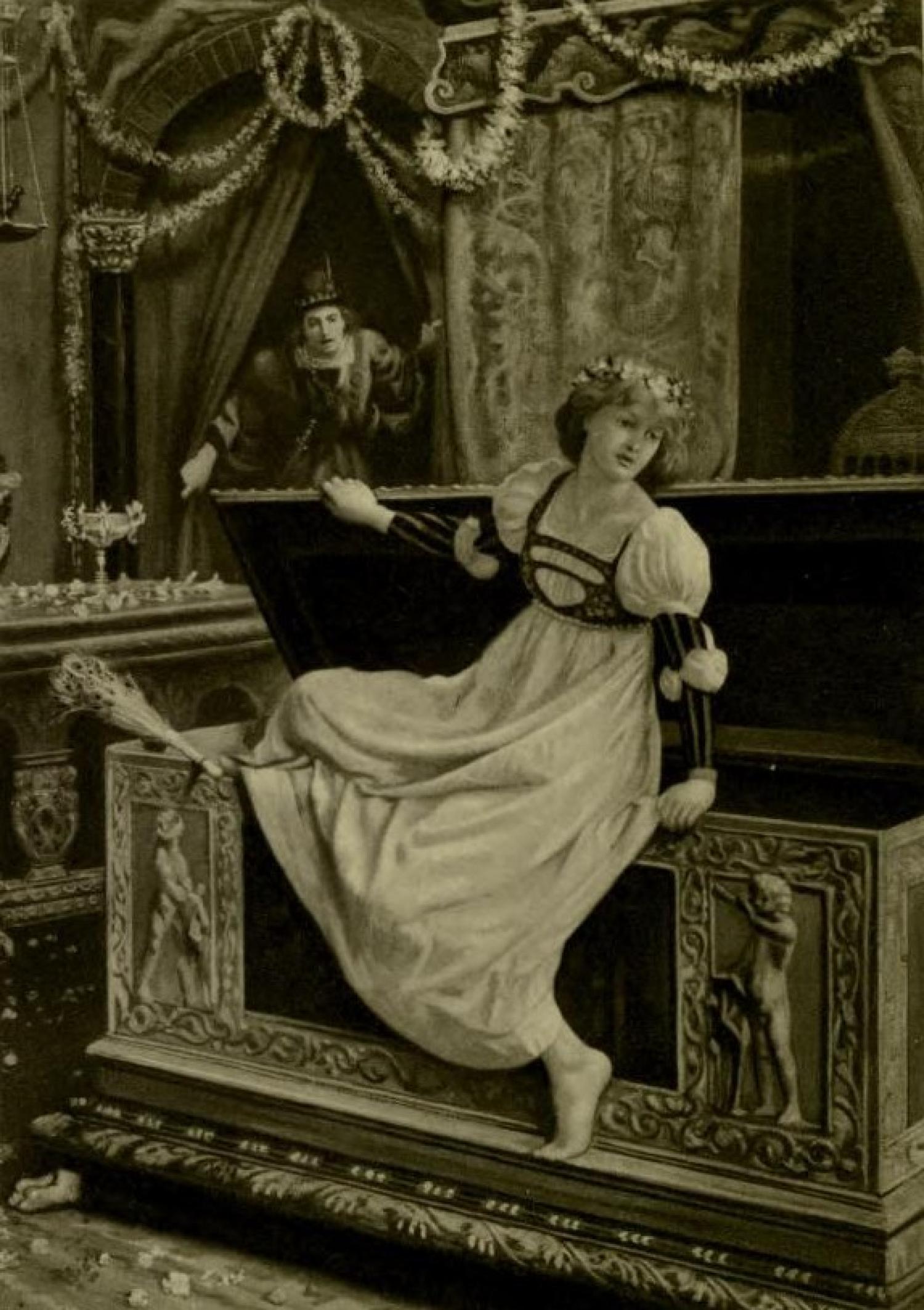“First Night, Fourth Fable.” The Nights of Straparola, Straparola, Giovanni Francesco, translated by Waters, W.G. (William George), London: Lawrence and Bullen, 1894, pp. 35-38.

Tale Summary
Tebaldo, Prince of Salermo, has a beautiful and wise wife who dies and instructs him not to marry someone whose finger does not fit her own ring. After sending home every woman who courted him, his own daughter, Doralice, finds the ring to fit her perfectly, and Tebaldo becomes taken with the idea of wedding her. Upon hearing this, Doralice seeks the advice of her maid, who promises to keep her virginity safe. She instructs the daughter to hide in a wardrobe until a better fate befalls her, and after a long time of asking for her whereabouts, the prince eventually has the wardrobe sold. The maid watches as a rich dealer from Genoa loads the item onto his ship, and thinks to herself that when faced with two evils it is best to choose the lesser. Arriving in Britain (England), king Genese demands that the merchant sell the chest to him. Every day Doralice emerged from the chest to make the king’s room neat, and Genese hides to spy who was cleaning and sprucing. Catching her and hearing her story, the king falls in love and marries her, having with her 2 children. Tebaldo, meanwhile still obsessed with his daughter, dressed as a merchant and tracks her down. She does not recognize him but is overcome with his offerings, which he says he will give to her if he may spend one night in the room where her children slept. That night, he kills the two of them with a dagger that the queen wears, having stolen it from her in her sleep. Now dressing as an astrologer, Tebaldo tells the king that someone wearing a bloody dagger is the culprit, leading him to his wife, and Genese commands that Doralice be buried up to her chin for the worms to eat her. Tebaldo returns home and brags of his accomplishment to the maid, who rides the next day to England in order to save Doralice with the truth. Upon hearing her story, Genese digs up his wife and musters troops to capture Salermo and its prince. Tebaldo is publicly tortured and eaten by dogs, and Genese and Doralice live together happily.
Fairy Tale Title
First Night, Fourth Fable
Fairy Tale Author(s)/Editor(s)
Giovanni Francesco Straparola
Fairy Tale Illustrator(s)
Edward Robert Hughes
Common Tale Type
Tale Classification
Page Range of Tale
pp. 35-38
Full Citation of Tale
“First Night, Fourth Fable.” The Nights of Straparola, Straparola, Giovanni Francesco, translated by Waters, W.G. (William George), London: Lawrence and Bullen, 1894, pp. 35-38.
Original Source of the Tale
Giovanni Francesco Straparola
Tale Notes
Eritrea tells this story, opening with a proclamation on the importance of love, and her enigma is:
“I tell you of a heart so vile,
So cruel, and so full of guile,
That with its helpless progeny
It deals as with an enemy.
And when it sees them plump and sleek,
It stabs them with its cruel beak.
For, lean itself, with malice fell,
It fain would make them lean as well.
So they grow thin with wasting pain,
Till nought but plumes and bones remain.”
The puzzle is difficult for the group, and Eritrea reveals that human parents can hate their children as much as the kite, which pecks at its young.
Research and Curation
Kaeli Waggener, 2022
Book Title
The Nights of Straparola
Book Author/Editor(s)
Giovanni Francesco Straparola; W.G. (William George) Waters
Illustrator(s)
Edward Robert Hughes
All Nights of Straparola Illustrations
Publisher
Lawrence and Bullen
Date Published
1894
Decade Published
1890-1899
Publisher City
London
Publisher Country
United Kingdom
Language
English
Rights
Public Domain
Digital Copy
Available at the Internet Archive
Book Notes
This book is a collection of stories that are structured under a ‘frame tale,’ or overarching narrative. After the departure of Milan’s ruler amongst unrest, a party is held on the Island of Murano, with his daughter and her 10 court ladies taking turns to tell stories over the course of 13 nights. Each night 5 ladies will sing before narrating a tale on an agreed-upon theme, offering a pastime and a way to stimulate the wit.
Notes on narrators
Lodovica; admired for her beautiful eyes
Vicenza; possessing beauty and good manners
Lionora; kindly and courteous despite her haughty appearance
Alteria; devoted in service
Lauretta; disdainful and seductive
Eritrea; petite and beautiful
Cateruzza (surnamed Brunetta); graceful, loving, alluring
Arianna; young but grave, virtuous, and well-spoken
Isabella; highly gifted and witty
Fiordiana; Intelligent and willing

